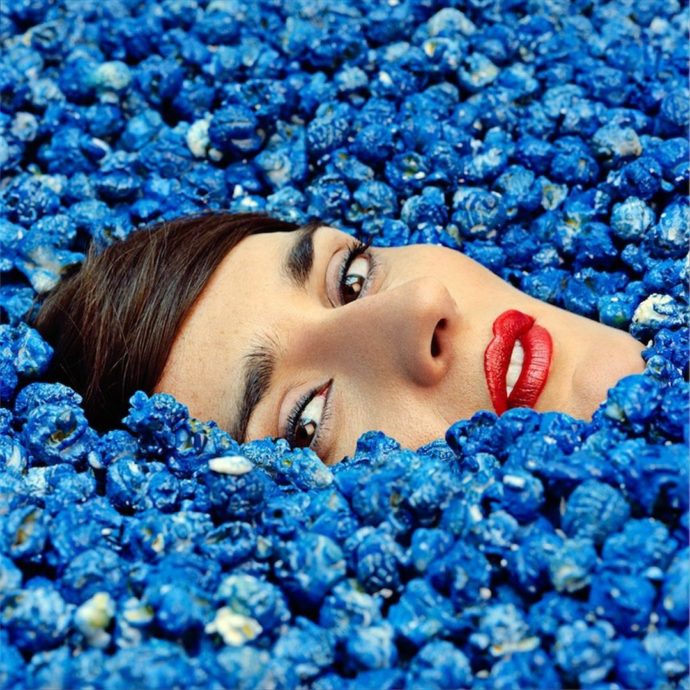There aren’t many francophone artists who gain traction in the English-speaking United States, but Yelle are doing just that. As I write this review, they are touring North America with just one date in the predominantly French-speaking Montreal. They’ve toured the United Kingdom with Katy Perry and set out on their own world tour, spending three years supporting their last album. They attracted the attention of American producer Dr. Luke (known for writing pop hits like “Since U Been Gone” and “I Kissed a Girl,”) who signed them to his vanity label for their third and latest album, Complètement fou (which translates to “completely crazy.”) Yelle’s website is bilingual, offering updates and lyrics for their older songs in both French and English, though their albums are completely en français. So how does a French electropop band appeal to English-speaking audiences? Simply put, they have catchy, glossy songs.
Yelle is made up of singer Julie Budet (who goes by Yelle, but in the interest of keeping her and the band separate, she’ll be referred to by her legal name,) and producers GrandMarinier (Jean-François Perrier) and Tepr (Tanguy Destable.) With Budet writing the lyrics and the other two producing, they craft bouncy synth electropop. Budet has a beautiful voice and sings in an incredibly beautiful language. Even if you have no idea what she’s saying, it sounds nice. That is precisely why this album can appeal to those who don’t speak any French. Yelle is comparable to Dragonette or Robyn, with pretty female vocals over dancey-tracks. Sure, Dragonette and Robyn have some good lyrics, but you can also appreciate the catchiness of the songs without even noting the lyrics.
There are a lot of bubbly sounds, including ironically in “Coca sans bulles” (“Coke without bubbles.”) It’s so bouncy, it could be the soundtrack to a children’s aerobics class. We’re talking The Lego Movie’s “Everything Is Awesome”-level of sparkly. The songs are dance-able, though there are a few slower tracks thrown in. One of the slower songs is hurt by the bouncy sounds, though. “Les soupirs et les refrains” (“the sighs and the refrains”) could be a moving song, but the fake handclaps and weird boing-y sound really take away from the song. There isn’t much organic going on here, there are a few guitar chords on “Un jour viendra,” and that is about it for “real” sounds. “Jeune file garnement” mixes in a lot of different percussion sounds, including steel drums, which adds a little extra interest that some of the other songs are missing.
If you are able to understand some French (thanks, 12 years of French classes and Babelfish!) you’ll find that the songs can be a bit racier than they initially sound. Sure, “Nuit du baise II,” the one song with male lead vocals, sounds like a song for getting busy (think Prince,) “Nuit du baise I” sounds innocent with Budet’s sweet voice and music that could have been going on in the background of Napoleon Dynamite. It’s not so innocent: the title translates to “night of fucking.” Part 1 is bouncy and even throws a pan flute in at the end, you’d never guess that the opening line is about giving a full-body massage with one’s mouth. Remember in the last paragraph when I said one song sounds like it could be played in a children’s aerobics class? Do not play this album in a children’s aerobics class. There’s another song about how to get guys by making circles with one’s pelvis (“Ba$$in,”) and another about everyone lying all the time (“Toho.”) It gets more innocent, like a tourist’s love letter to Florence (“Florence en Italie.”)
Yelle’s strength in moving into the English-speaking market will be their dancefloor-ready catchy synth-driven electropop songs, which is why I was surprised by the album’s first single. “Bouquet final” is one of the slower songs with simpler effects, one that would rely more on the lyrics than danceability. Given that the band seems to try to be anglophone-friendly, I found it odd that they wouldn’t choose one of the faster, catchier songs like “Complètement fou” (which is similar to Kiesza’s “Hideaway” with a little old-school Jamiroquai at the end) or the early-‘90s inspired “Ba$$in.”
This is a shiny album that borders on being over-produced. The dancy beats transcend language; the emotion on the sultry “Nuit du baise II” and on the only slightly morbid “Dire qu’on va tous mourir” (“say that we will all die”) come through despite the language barrier. “Toho’s” sharp enunciation on the verses and soaring chorus conveys emotional highs and lows. Though the lyrics are decent, you’re not missing anything incredibly deep if you don’t understand them. This is a glossy 13 songs that you don’t have to overthink.
Rating: 6.7/10


Nice but you butchered half of the song titles and the name of a band member (Grand Marnier is the correct spelling and it’s a booze type)